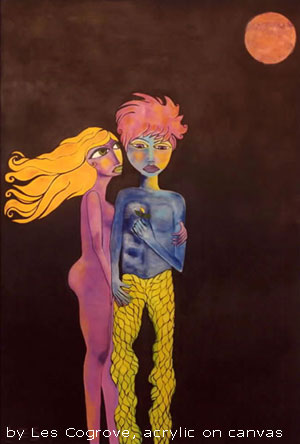Born in India, Ashoke Dasgupta [www.geocities.com/lemuriaca/information.html]
won the UNDP-Goethe Institute Award for Environmental Journalism in Nepal
1995; was Copy Editor for The Independent, in Kathmandu, and in Nepal
he served as Senior Editor for Pilgrims Book House. He immigrated to Canada
1997.
Devdas is a lush, lyrical, intense Bollywood melodrama.
Except for the middle and upper-classes that number about 100 million, life
is nasty, brutish and short for the other 90% per-cent-plus population of India.
Predictably, the have-nots (rickshaw-pullers, taxi drivers, maid-servants) are
always looking to divert their attention from the often harsh realities of their
lives, in a land without enough jobs, welfare or social security.
 If
Bollywood fortunes have been typically assured by providing opium for the masses,
Director Sanjay Leela Bhansali’s Devdas is an even bigger-than-usual
musical extravaganza based on a 1917 hot-button novel by nationally celebrated
Bengali writer, Sarat Chandra Chatterjee. It is probably as a mark of respect
to the Bengali novelist that the thespians occasionally break out into the Bengali
language, though 99 per cent of the dialogue takes place in Hindi -- with well-crafted,
sometimes even creative, English subtitles. This is (one of) the first Bombay
movies to pique the interest of international audiences.
If
Bollywood fortunes have been typically assured by providing opium for the masses,
Director Sanjay Leela Bhansali’s Devdas is an even bigger-than-usual
musical extravaganza based on a 1917 hot-button novel by nationally celebrated
Bengali writer, Sarat Chandra Chatterjee. It is probably as a mark of respect
to the Bengali novelist that the thespians occasionally break out into the Bengali
language, though 99 per cent of the dialogue takes place in Hindi -- with well-crafted,
sometimes even creative, English subtitles. This is (one of) the first Bombay
movies to pique the interest of international audiences.
Devdas (Shahrukh Khan), a foreign student in Britain, returns
home to find Paro (former Miss World Aishwariya Rai) still living next door,
the lower-caste girl and childhood playmate who is still in love with him, despite
the passage of years. His family condemns the romance with someone beneath its
socio-economic status; eventually, Paro is married off to an older man who requires
a ‘lady’ for his manor and ‘mother’ for his children
by an earlier marriage. Devdas enters a life of debauchery with fellow-foreign
student Chuni [Jackie Shroff], hopeful that drinking and Chandramukhi’s
(Madhuri Dixit) cathouse will help him forget Paro. Inexorably working towards
a climax that is almost Shakespearian in its dimensions, Devdas learns that
he cannot fool himself into believing that he doesn’t love Paro.
The lachrymose, three-hour storyline makes two assumptions:
that is possible to die of unfulfilled love, and that one may have but a single
soul-mate.
The film’s sets and costumes are as detailed as they
are sumptious; the gold, marble and silken scenes as chaste as erotic. One can
easily believe that this is the most expensive movie to be yet made in Bombay.
Some of the costumes cost $47,000 each, and the glittering bordello $4 million.
Indian police are investigating allegations that the $13 million Devdas
may have been funded by gangsters. Producer Bharat Shah is alleged to have received
Mafia funds, dragging the film into a controversy surrounding the Indian film
industry's links with the underworld. In that respect, of course, its methods
of financing may not differ from its counterparts the world over.
Choreographer Birju Maharaj has injected some pizzazz into
the otherwise traditional Indian dances: the spectacular color, light, texture
and musical scenes occurring against the backdrop of the caste system keeping
the lovers apart. All the action takes place in the homes of Devdas and Paro,
and in Chandramukhi’s brothel. Each of these settings could put a Maharaja’s
palace to shame, and the meticulous editing doesn’t allow even a glimpse
of the dust, crowds, heat and noise pollution of modern India.
Though the lead actor, Shahrukh Khan, may not yet be a household
name in the West, filmgoers may remember him from another Bollywood epic, Asoka,
in which he starred and also produced.
The Devdas remake and the legendary tale of warrior-king Asoka
have been milestones in the globalization of the Bollywood film industry. Both
films were marketed in the West, Devdas proving especially favored after
receiving a standing ovation at this year's Cannes Film Festival.
THE END
Voice Your Opinion
- Return to
the Table of Contents - HOME
 If
Bollywood fortunes have been typically assured by providing opium for the masses,
Director Sanjay Leela Bhansali’s Devdas is an even bigger-than-usual
musical extravaganza based on a 1917 hot-button novel by nationally celebrated
Bengali writer, Sarat Chandra Chatterjee. It is probably as a mark of respect
to the Bengali novelist that the thespians occasionally break out into the Bengali
language, though 99 per cent of the dialogue takes place in Hindi -- with well-crafted,
sometimes even creative, English subtitles. This is (one of) the first Bombay
movies to pique the interest of international audiences.
If
Bollywood fortunes have been typically assured by providing opium for the masses,
Director Sanjay Leela Bhansali’s Devdas is an even bigger-than-usual
musical extravaganza based on a 1917 hot-button novel by nationally celebrated
Bengali writer, Sarat Chandra Chatterjee. It is probably as a mark of respect
to the Bengali novelist that the thespians occasionally break out into the Bengali
language, though 99 per cent of the dialogue takes place in Hindi -- with well-crafted,
sometimes even creative, English subtitles. This is (one of) the first Bombay
movies to pique the interest of international audiences.